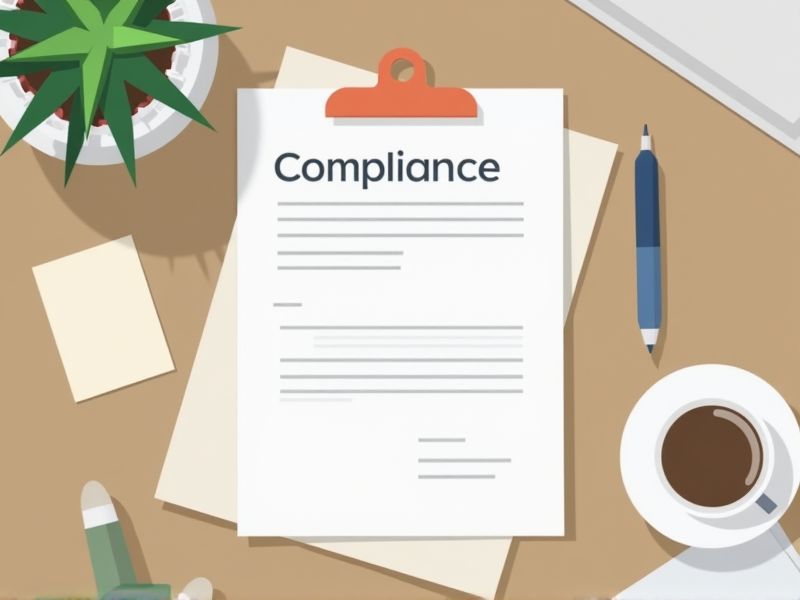
Compliance Managers play a crucial role in ensuring organizations adhere to applicable laws, regulations, and internal policies. Obtaining certain certifications enhances their credibility and provides the necessary expertise to navigate complex regulatory environments. Certifications often signify a deep understanding of risk management and the ability to implement effective compliance strategies. Some essential certifications required for a Compliance Manager include the following.
Certified Compliance & Ethics Professional (CCEP)
The role of a Compliance Manager requires a thorough understanding of compliance frameworks, and earning the Certified Compliance & Ethics Professional (CCEP) designation ensures expertise in these areas. The CCEP certification enhances credibility, indicating to stakeholders that the holder possesses up-to-date knowledge of regulatory requirements and ethical practices. Companies benefit from hiring CCEP-certified professionals because it mitigates risks associated with non-compliance, which can lead to fines and reputational damage. Certification also equips Compliance Managers with best practices and tools necessary to navigate complex legal landscapes effectively.
Certified Regulatory Compliance Manager (CRCM)
Organizations face ever-evolving regulations; a Certified Regulatory Compliance Manager (CRCM) ensures that compliance managers stay informed and apply up-to-date standards. Complexities in financial regulations demand CRCM expertise to navigate and implement efficient compliance strategies. Non-compliance can lead to costly fines and reputational damage; a CRCM minimizes such risks through robust policy frameworks. With a CRCM, organizations enhance credibility and trust by ensuring operations adhere to regulatory expectations.
Certified Fraud Examiner (CFE)
Having a Certified Fraud Examiner (CFE) on board enhances a Compliance Manager's ability to identify and address potential fraudulent activities. This expertise strengthens the organization's defense mechanisms against regulatory violations. The CFE's specialized skills assist in conducting thorough investigations and forensic analyses. This capability reduces financial losses and legal liabilities associated with fraud.
Certified Risk and Compliance Management Professional (CRCMP)
Having a CRCMP certification equips a Compliance Manager with the essential knowledge to effectively assess and manage organizational risk. This certification ensures a standardized understanding of global compliance and risk management frameworks. It validates the individual's expertise and enhances the credibility of the compliance department. Organizations benefit from a Compliance Manager with CRCMP by minimizing the chances of regulatory breaches and potential penalties.
Certified in Healthcare Compliance (CHC)
Certification in Healthcare Compliance (CHC) equips compliance managers with a comprehensive understanding of relevant laws and regulations, which is crucial to prevent legal pitfalls. Professionals with CHC credentials are often better at developing effective compliance programs due to their specialized training. CHC serves as a benchmark of competency, improving trust and credibility with stakeholders. Certified managers are more effective in identifying and mitigating compliance risks, leading to a more efficient and secure healthcare facility.
Certified Information Privacy Professional (CIPP)
Compliance managers must stay ahead of evolving privacy regulations, and obtaining a CIPP certification ensures they have an in-depth understanding of global legal frameworks. Organizations require comprehensive data protection strategies, and CIPP-certified professionals possess the knowledge to implement these effectively. The complexity of privacy laws across different jurisdictions demands specialists who can navigate these intricacies, validated through CIPP certification. Credibility in compliance roles is significantly enhanced by such certification, as it signals a commitment to upholding stringent privacy standards.
Certified Internal Auditor (CIA)
A Certified Internal Auditor provides a comprehensive understanding of internal controls, which is essential for a Compliance Manager to ensure organizational adherence to laws and regulations. The CIA credential validates expertise in risk management, helping the Compliance Manager effectively mitigate potential compliance breaches. A CIA can conduct thorough audits, which assist Compliance Managers in identifying areas of vulnerability within compliance frameworks. The certification equips a Compliance Manager with the skills to enhance corporate governance practices, thereby strengthening the organization's ethical standards and compliance processes.
Certified Information Systems Auditor (CISA)
A Compliance Manager is responsible for ensuring that a company adheres to external regulations and internal policies. With a Certified Information Systems Auditor (CISA) qualification, they can better assess and manage risks related to information systems. CISA provides expertise in auditing, control, and security, which strengthens a Compliance Manager's ability to maintain compliance. This certification also enhances credibility and demonstrates commitment to upholding industry standards in IT governance.
Certified Data Privacy Solutions Engineer (CDPSE)
The role of a Certified Data Privacy Solutions Engineer (CDPSE) strengthens a Compliance Manager's ability to accurately assess an organization's adherence to data privacy regulations. The CDPSE's expertise in implementing and managing privacy solutions helps ensure that the company's processes align with current legislative requirements, reducing the potential for data breaches and associated penalties. Insight provided by a CDPSE contributes to developing and refining privacy policies, enabling the organization to respond effectively to evolving privacy laws. By integrating a CDPSE into the compliance team, companies can streamline their efforts in maintaining continuous compliance, thus fostering trust and protecting stakeholder interests.
Project Management Professional (PMP)
Achieving a Project Management Professional (PMP) certification equips a Compliance Manager with structured project management methodologies, crucial for effectively handling compliance projects. It enhances risk management skills, essential for identifying and mitigating compliance risks. PMP certification fosters improved communications and stakeholder management, necessary for navigating complex regulatory environments. Enhanced organizational skills from PMP training ensure compliance projects adhere to deadlines and procedural requirements.
Summary
With certifications, you will likely enhance your expertise and credibility as a Compliance Manager. This often leads to more effective policy implementation and enforcement. Organizations tend to experience reduced risks and improved regulatory adherence. Career opportunities and potential salary increases can also become more attainable for you.
